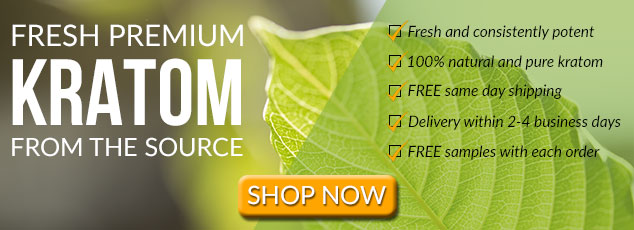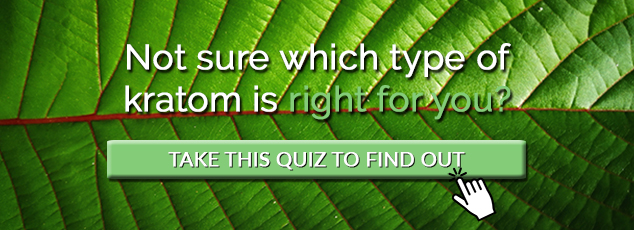Opioid addiction is a growing concern. With nearly 70,000 opioid overdose deaths in 2018, the number keeps speedily growing. Heroin is one of these opioids, and its use and overdose deaths have been on an incline, as well, with nearly 15,000 lives claimed in 2018 alone. The interest in using kratom to quit heroin and other opioids is also on the rise.
What Is Heroin?
Heroin is a highly addictive and illegal opioid drug. It’s produced from morphine, a natural substance that can be found in the seed pod of the opium poppy. Heroin binds to opioid receptors within the brain, resulting in reduced pain and feelings of euphoria.
Heroin use isn’t safe, and it has a wide range of short-term and long-term negative effects.
It is possible to overdose on heroin. Moreover, it causes respiratory depression, which can result in coma, brain damage, or even death.
Sadly, around a million Americans report having used heroin in the past year, and this number and related issues only keep growing.

Heroin Use Disorder
Heroin is a highly addictive substance. It also creates tolerance in those taking in regularly. As a result, it makes it increasingly dangerous for one to use heroin.
Sadly, however, prescription opioids like Vicodin and OxyContin have a striking similarity to heroin. As a result, misuse of these medications or the inability to access them can lead to a person with chronic to starting taking heroin as a means of managing it.
That’s not the only reason for one to start taking heroin. Others use it to manage anxiety or depression, feel better, and more. A significant number also do so merely out of curiosity or due to peer pressure.
Quitting heroin, though, can be extremely hard, which is why many need professional help.
Common Heroin Use Disorder Treatment Methods
The most common means of treatment are behavioral therapy and medication. Usually, a combination of both is used.
Medications that are commonly used to treat and overcome opioid addiction target the same receptors in the brain. Yet, they are deemed safer. Two common medications to treat heroin use disorder are:
- Methadone – a slow-acting opioid agonist. It’s an oral medication. Therefore, it reaches the brain slowly, as opposed to heroin. The person experiences a much weaker “high” and less likely to experience withdrawal symptoms. Unfortunately, methadone use can also be addictive and lead to overdose. Methadone also has numerous side effects that include drowsiness, constipation, confusion, coma, or death.
- Buprenorphine – a partial opioid agonist. This sublingual medication reduces cravings and can also relieve pain. However, it also has negative side effects and potential for abuse and addiction.
- Naltrexone– an opioid antagonist. This medication blocks the action of opioids and is neither sedating nor addictive. While it is a safer alternative to the medications above, one needs to comply with their treatment. Otherwise, the drug loses its effectiveness.
The issue with many medications that treat heroin and other opioid use disorder is that they too are opioids or opiates. Due to that, one may jump from one addiction into another.
This is precisely what happened to Steven Koontz, a 56-year old male, who decided to share his kratom story with us.

How Steven Quit Heroin with Kratom
Steven was addicted to heroin for thirty years. For him, it didn’t start as a means of getting pain relief. “I started with smack and fell in love immediately,” he says.
Regardless of the severity of his countless withdrawals, Steven was unable to quit. He tells us: “I have gone through withdrawal more times than I can count and no matter how horrendous the withdrawal, I would go back.”
As a means of getting off of heroin, Steven was prescribed methadone. Yet, it didn’t help as expected. Doctors prescribed additional medication to deal with the side effects of the prescription drug. Steven also spent time in rehabilitation centers and mental hospitals, against his choice.
“I was on methadone for almost five years, and that was harder to kick than heroin. Doctors wanted to put me on anti-depressants and mood stabilizers, but I hated how I felt on those, so I refused meds. I have been committed against my will twice to mental hospitals and in rehab seven or eight times.”
Everything changed for Steven when his youngest son introduced him to kratom.
“I tried it because I was out of ideas,” he admits.
Luckily, it was a good choice for Steven that he is grateful for: “I thank God for taking me down the path….and my baby boy.”
Not only he feels exponentially better now, but his craving for heroin is no longer an issue.
“It was three years ago since I have had dope. The drastic mood changes, days of lying in bed are almost gone. There are days, but they never last. The most amazing thing happened when I started kratom. The craving for heroin is gone. I’m not being over-dramatic. The desire for that high is just not there.”
Studies on Kratom and Its Effectiveness in Treating Opioid Addiction
While many take kratom to quit heroin and other opioids as well as beat alcohol addiction and have shared their positive experiences in surveys such as the John Hopkins study, official studies on the effectiveness of kratom are scarce.
But not for long. NIDA awarded the University of Florida College of Pharmacy two grants worth nearly 7 million USD. The study is led by Christopher McCurdy, a pioneer in kratom studies in the US, and its objective is to study kratom alkaloid and their effectiveness in treating opioid addiction.
Hopefully, this research will shed more light on kratom and result in a more positive reputation of the herb in the media.
Has kratom changed your life, too? Help us spread the word about kratom and its numerous benefits and uses to those who need it most! Share your kratom story here.


Leave a Reply